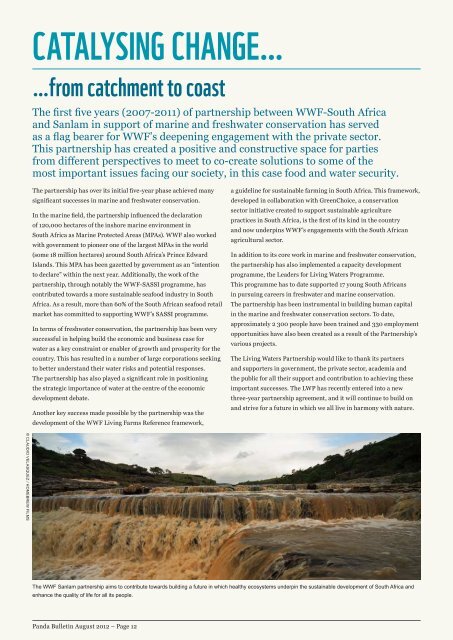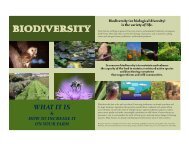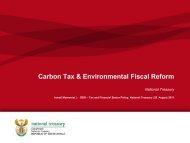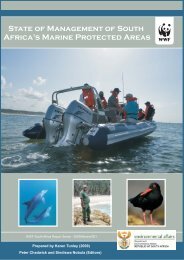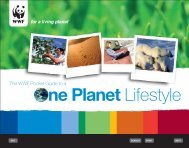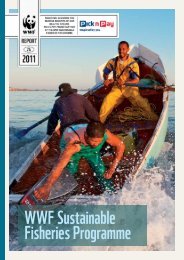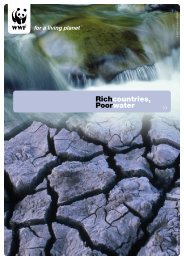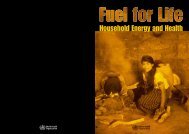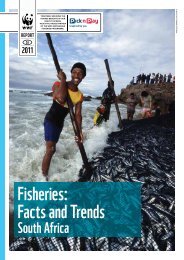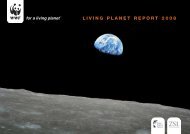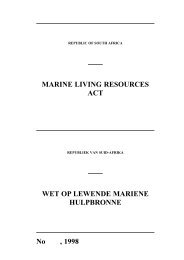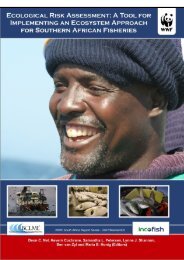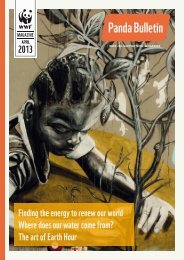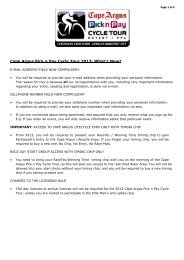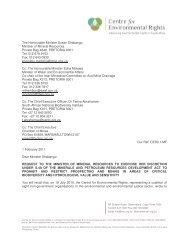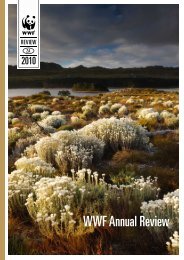Living Planet Report - WWF South Africa
Living Planet Report - WWF South Africa
Living Planet Report - WWF South Africa
Create successful ePaper yourself
Turn your PDF publications into a flip-book with our unique Google optimized e-Paper software.
© ClAuDio VelASQuez / HoMeBreW FilMS<br />
CATALYSING ChANGE…<br />
…from catchment to coast<br />
The first five years (2007‑2011) of partnership between <strong>WWF</strong>‑<strong>South</strong> <strong>Africa</strong><br />
and Sanlam in support of marine and freshwater conservation has served<br />
as a flag bearer for <strong>WWF</strong>’s deepening engagement with the private sector.<br />
This partnership has created a positive and constructive space for parties<br />
from different perspectives to meet to co-create solutions to some of the<br />
most important issues facing our society, in this case food and water security.<br />
The partnership has over its initial five‑year phase achieved many<br />
significant successes in marine and freshwater conservation.<br />
In the marine field, the partnership influenced the declaration<br />
of 120,000 hectares of the inshore marine environment in<br />
<strong>South</strong> <strong>Africa</strong> as Marine Protected Areas (MPAs). <strong>WWF</strong> also worked<br />
with government to pioneer one of the largest MPAs in the world<br />
(some 18 million hectares) around <strong>South</strong> <strong>Africa</strong>’s Prince Edward<br />
Islands. This MPA has been gazetted by government as an “intention<br />
to declare” within the next year. Additionally, the work of the<br />
partnership, through notably the <strong>WWF</strong>-SASSI programme, has<br />
contributed towards a more sustainable seafood industry in <strong>South</strong><br />
<strong>Africa</strong>. As a result, more than 60% of the <strong>South</strong> <strong>Africa</strong>n seafood retail<br />
market has committed to supporting <strong>WWF</strong>’s SASSI programme.<br />
In terms of freshwater conservation, the partnership has been very<br />
successful in helping build the economic and business case for<br />
water as a key constraint or enabler of growth and prosperity for the<br />
country. This has resulted in a number of large corporations seeking<br />
to better understand their water risks and potential responses.<br />
The partnership has also played a significant role in positioning<br />
the strategic importance of water at the centre of the economic<br />
development debate.<br />
Another key success made possible by the partnership was the<br />
development of the <strong>WWF</strong> <strong>Living</strong> Farms Reference framework,<br />
Panda Bulletin August 2012 – Page 12<br />
a guideline for sustainable farming in <strong>South</strong> <strong>Africa</strong>. This framework,<br />
developed in collaboration with GreenChoice, a conservation<br />
sector initiative created to support sustainable agriculture<br />
practices in <strong>South</strong> <strong>Africa</strong>, is the first of its kind in the country<br />
and now underpins <strong>WWF</strong>’s engagements with the <strong>South</strong> <strong>Africa</strong>n<br />
agricultural sector.<br />
In addition to its core work in marine and freshwater conservation,<br />
the partnership has also implemented a capacity development<br />
programme, the Leaders for <strong>Living</strong> Waters Programme.<br />
This programme has to date supported 17 young <strong>South</strong> <strong>Africa</strong>ns<br />
in pursuing careers in freshwater and marine conservation.<br />
The partnership has been instrumental in building human capital<br />
in the marine and freshwater conservation sectors. To date,<br />
approximately 2 300 people have been trained and 330 employment<br />
opportunities have also been created as a result of the Partnership’s<br />
various projects.<br />
The <strong>Living</strong> Waters Partnership would like to thank its partners<br />
and supporters in government, the private sector, academia and<br />
the public for all their support and contribution to achieving these<br />
important successes. The LWP has recently entered into a new<br />
three-year partnership agreement, and it will continue to build on<br />
and strive for a future in which we all live in harmony with nature.<br />
The <strong>WWF</strong> Sanlam partnership aims to contribute towards building a future in which healthy ecosystems underpin the sustainable development of <strong>South</strong> <strong>Africa</strong> and<br />
enhance the quality of life for all its people.


